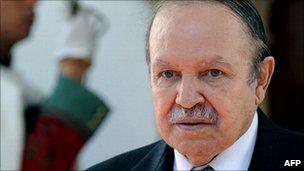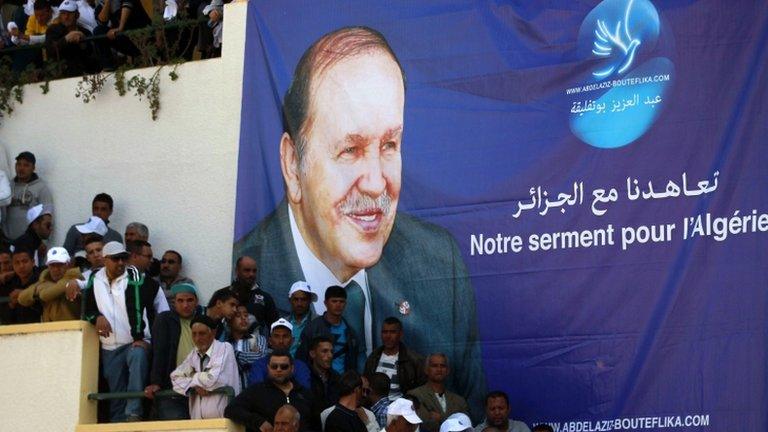Algeria profile - leaders
- Published
President: Abdelaziz Bouteflika

President Bouteflika was re-elected in April 2014 despite being seldom seen in public
Abdelaziz Bouteflika won the presidency in the 1999 polls and secured landslide election victories in 2004 and again 2009.
He went on to win a fourth term in office in April 2014, despite doing no personal campaigning and rarely appearing in public after having suffered a stroke in 2013.
Mr Bouteflika took 82% of the vote, but turnout was reported to be 52%, down from 75% in 2009.
A coalition of Islamist and secular opposition parties had called for a boycott, describing the election as a sham and saying Mr Bouteflika was unfit to run because of his health problems.
Three other presidential candidates pulled out of the race soon after his candidacy was announced, saying the result would be a foregone conclusion.
'Setback for reform'
Mr Bouteflika first took office when Algeria was still caught up in a savage civil war with Islamist insurgents, and is credited with curbing the conflict and restoring economic stability.
But when he amended the constitution in November 2008 and removed the two-term limit on the presidency, Mr Bouteflika effectively gave himself the option of remaining head of state for life - a change criticised as a setback for democratic reform.
As in many Arabic-speaking countries, the government faced calls for democratic change in 2011, but protests did not reach the scale seen elsewhere.
Nonetheless Mr Bouteflika announced a programme of constitutional change to avert pressure for more radical reform.
Passed in 2016, the changes restored the presidential two-term limit and expanded parliament's powers, but critics dismissed them as superficial.
When he first became president in 1999, Mr Bouteflika promised to restore national harmony and to end years of bloodshed.
He released thousands of Muslim militants and won backing for a civil concord that offered an amnesty to armed militants.
Many of the rebels accepted and violence declined. Voters backed a second amnesty for the remaining militants, laid out in the president's "charter for peace and reconciliation", in a 2005 referendum.
Renewed Islamist action
Algeria under President Bouteflika has won praise from the West for backing the US-led "war on terror".
At home, many credited him with a return of some security, though attacks by Islamist militants have increased again since 2006.
Mr Bouteflika has overcome years of isolation for Algeria, but his state-orientated economic policies have failed to wean the economy off reliance on oil and gas.
A veteran of the war of independence from France, Mr Bouteflika was foreign minister for 16 years until 1979.
He went into self-imposed exile for several years in the 1980s to escape corruption charges that were later dropped.
Power is concentrated in the presidency, with parliament largely a rubber-stamp body. Mr Bouteflika is widely credited with easing the military back into barracks after their domination of government during the 1992-2011 state of emergency.
- Published15 April 2014
